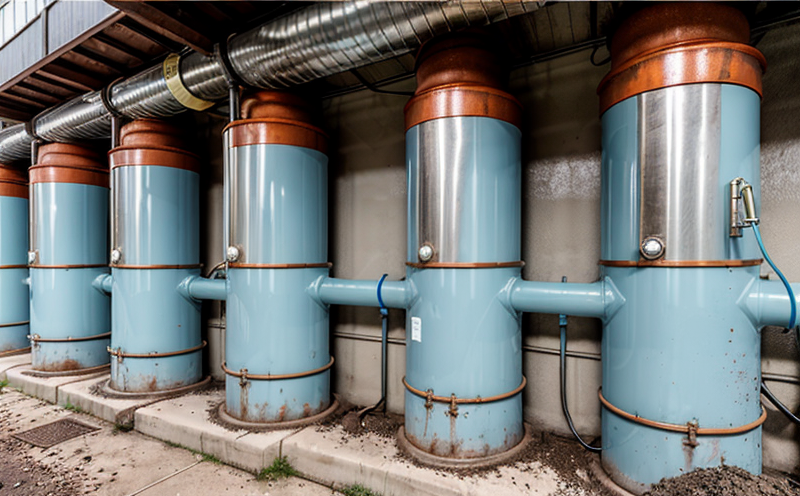ASTM D1193 Deposit Formation Test in Water Systems
The ASTM D1193 Deposit Formation Test is a critical standard used to assess the potential for scale, corrosion, and deposit formation within water systems. This test evaluates how susceptible different materials are to forming deposits under specific conditions of water quality, flow rates, and temperature. It is particularly useful in sectors such as HVAC, industrial cooling systems, and potable water distribution networks where the integrity and efficiency of the system can be compromised by mineral scaling or corrosion.
The ASTM D1193 methodology involves subjecting test coupons to a controlled environment that simulates real-world conditions found in water systems. The test subjects include metallic materials like carbon steel, stainless steel, aluminum, brass, copper, and cast iron, which are commonly used in plumbing fixtures, heat exchangers, and other components of water systems.
The process begins with the preparation of the coupons by cleaning them thoroughly to remove any surface contaminants that could influence the test results. The coupons are then immersed in a solution designed to mimic the composition of the water expected in the intended application. This can include various salts, minerals, and other constituents that contribute to scaling or corrosion.
The temperature and flow rate of the solution are controlled according to ASTM D1193 standards to simulate real-world conditions as closely as possible. The coupons remain in this environment for a specified duration, typically up to 500 hours, depending on the expected operational life of the material in question.
After the test period, the coupons are removed from the solution and thoroughly cleaned again to eliminate any residual deposits or corrosion products. The results are then analyzed by measuring the weight gain (or loss) of the coupons, which provides a quantitative measure of the amount of deposit formed or the extent of corrosion that has occurred.
Understanding the implications of these tests is crucial for quality managers and compliance officers who need to ensure regulatory adherence. This test helps in selecting materials that are resistant to scaling and corrosion, thereby extending the operational life and efficiency of water systems. For R&D engineers, this test provides valuable insights into material performance under various conditions, allowing them to optimize designs and improve product reliability.
ASTM D1193 is widely recognized as a benchmark for assessing deposit formation in water systems, ensuring that materials used are suitable for long-term service in challenging environments. This standard not only supports compliance with regulatory requirements but also enhances the overall quality of products used in critical applications like HVAC and industrial cooling.
The ASTM D1193 test is essential for procurement teams as it aids in selecting suppliers who provide materials that meet stringent quality standards, thereby reducing maintenance costs and ensuring reliability. By adhering to this standard, manufacturers can demonstrate their commitment to producing high-quality products that are reliable and safe for use in water systems.
Why Choose This Test
- Comprehensive Evaluation: The ASTM D1193 test provides a comprehensive evaluation of how different materials behave under real-world conditions, offering valuable insights into their resistance to scaling and corrosion.
- Regulatory Compliance: This test helps ensure compliance with international standards, which is crucial for manufacturers aiming to meet regulatory requirements in various countries.
- Material Selection: By selecting materials that perform well under ASTM D1193 conditions, engineers can optimize their designs and improve product reliability.
- Versatility: The test is versatile and can be adapted to different types of water systems, ensuring that the results are relevant to various applications.
Customer Impact and Satisfaction
The ASTM D1193 Deposit Formation Test significantly impacts customer satisfaction by providing reliable materials that ensure long-term performance. By selecting materials based on this test, customers can be assured of high-quality products that are resistant to scaling and corrosion, thereby reducing maintenance costs and ensuring reliability.
For quality managers and compliance officers, the test results provide a clear indication of material suitability, helping them make informed decisions about supplier selection and product quality. This enhances customer trust and satisfaction by delivering products that meet or exceed expectations.
The role of ASTM D1193 in R&D cannot be overstated, as it enables continuous improvement in materials science. By incorporating the insights gained from this test into new product development, manufacturers can stay ahead of market trends and meet evolving customer needs.
Competitive Advantage and Market Impact
The ASTM D1193 Deposit Formation Test provides a competitive advantage by ensuring that products are reliable and perform well under real-world conditions. This is crucial in maintaining the integrity of water systems, which can be compromised by scaling or corrosion.
By adhering to this standard, manufacturers can differentiate themselves from competitors who may not meet the same stringent quality standards. This enhances market position and customer loyalty, as satisfied customers are more likely to recommend products to others.
The test also has a positive impact on the overall market by promoting higher standards of quality and reliability in water systems. As more manufacturers adopt this standard, it contributes to a safer and more efficient use of resources, ultimately benefiting both consumers and industry stakeholders.





